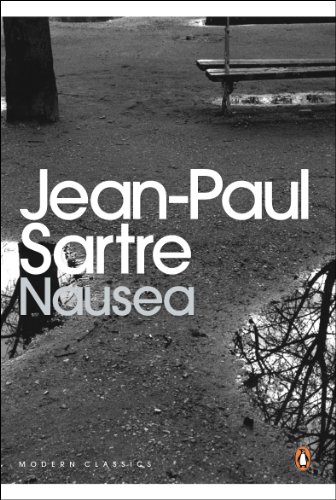The novel starts with this quote of L. F. Celine from 'The Church' – 'He is a fellow without any collective significance, barely an individual.' After that, the whole novel revolves broadly around the similar ideas of individual existence, although it will be a literary crime to describe this great novel's essence in a sentence. Jean-Paul Sartre's great work, his first novel, was an achievement and it furthered the ideas initially propagated by Dostoevsky and Rilke. This is a great novel of French existential philosophical tradition, where an individual is trying to find meaning in a meaningless world. That individual is aware of his existence and tries to find the reasons behind his existence.
The novel's central character Antoine Roquentin is trying to write a history book based on an eighteenth-century diplomat Monsieur de Rollebon. He reads many books and notes in that endeavor but realizes that he is creating something which existed in the past but has no existence in the present. He abandons this as he becomes aware of his own existence. He then takes up the task of writing another book, a masterpiece. In his diary, he writes about this struggle as he proceeds and only, in the end, we realize that we are reading that masterpiece. The other two characters with which Roquentin interacts are Amy, his former love interest, and autodidact. Antoine Roquentin keeps on remembering Amy and during their conversation towards the end of the novel, they seem to reach towards the same conclusion, although they disagree in the end. Amy concludes that there are no perfect moments in life and Roquentin finds every object as superfluous. Roquentin calls autodidact by that name mockingly because he is a self-learner who goes to a library to read all the books in alphabetical order. He despises him because he thinks that he has only bookish knowledge.
When Roquentin starts becoming aware of his existence, he tries to find the actual meaning of existence. He tries to define the existence by seeing others and wondering once –
'I was in the middle of the room, the cynosure of all these grave eyes. I was neither a grandfather, nor a father, nor even a husband. I didn't vote, I scarcely paid any taxes; I couldn't lay claim to the rights of a taxpayer, nor to those of an elector, no even to the humble right to honour which twenty years of obedience confer on an employee. My existence was beginning to cause me serious concern. Was I a mere figment of the imagination?'
Roquentin derides the notion of humanity. He feels that an individual exists only in himself and only for himself. In this way, existentialism is a revolt against other prevalent "-isms". In fact, when autodidact says that, ".. If I were to go on a voyage, I think I should like to make written notes of every aspect of my character before leaving, so that on my return, I could compare what I used to be and what I have become. I've read that there are travelers who have changed physically and mentally to such an extent that their closest relatives didn't recognize them when they came back", it must have been something unacceptable to Roquentin. How can a person see the changes in himself until he is not aware of his existence unless he is talking about only superfluous changes?
The character of Roquentin has one more habit, rather an obsession. Sitting in a cafe, he observes people coming, chatting and leaving. He tries to find the reasons behind what people are doing. He tries to find the purpose of the life of other people. He thinks that people are doing everything without giving a moment to think why they are doing what they are doing. This is precisely the difference between a person who is aware and who is not, of his existence. He goes to an art gallery and listens to random people talking and he easily passes judgments, although with his reasons. In these thinking and observation sessions, Roquentin does a psychological analysis of qualities like boredom, alienation, absurdity, freedom and nothingness.
Roquentin thinks that all the objects are superfluous i.e. they do not serve any purpose. All the trees give birth to leaves continuously, all the humans walking in the park, they all are superfluous. He thinks of committing suicide but then decides against it because it will be superfluous. He also faces the absurdity of events and places in life. Seeing a statue, he says-
"The square may have been a cheerful place about 1800, with its pink bricks and its houses. Now there is something dry and evil about it, a delicate touch of horror. This is due to that fellow up there on pedestal. When they cast that scholar in bronze, they turned him into a sorcerer."
In the end, Jean-Paul Sartre decides that this life has to be lived. He finds the art as the purpose of life and chooses the life of an artist.

This comment has been removed by the author.
ReplyDelete